No business can be run without legal risk, so it’s important to understand what practices lead to high-risk and ways you can mitigate that risk. Emerzian Shankar Legal works directly with you to give you options when it comes to HR consulting matters.

HR consulting is “the practice of delivering all aspects of human resource management as an external provider,” according to the Society for Human Resource Management (SHRM). In other words, HR consultants help businesses and organizations manage their human resources — their employees — but are not themselves employed by these businesses and organizations. HR consulting can include help with employee relations, employee classification, compensation and benefits, recruiting, hiring and firing, employee handbooks and policies, legally required employee training, interactive dialogue process for employees with disabilities, and other tasks required to be legally compliant as an employer.

An HR consultant helps their clients comply with state and federal labor and employment laws. They advise and prepare documents such as employee handbooks, agreements, and other policies. They can deliver legally required employee training, such as sexual harassment prevention training. If they are an attorney, an HR consultant can also help with complaint management, including workplace and school investigations.

How much an HR consultant charges will depend on multiple factors, including experience and skill level. Sometimes the charge will be an hourly rate, while other times it can be a flat fee for a particular service (like a training session, for example). Having certain professional certifications and licenses also affects how much an HR consultant charges.
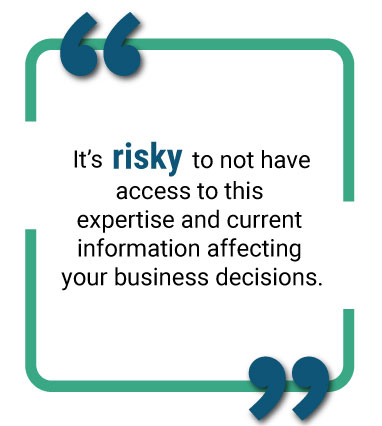
Unless you or someone else on your staff has HR expertise and the time to stay current on all the various HR laws and requirements, you need an HR consultant. Additionally, laws can be complex and interpreted differently, so an attorney HR consultant can help advise you on options for compliance. It’s risky to not have access to this expertise and current information affecting your business decisions. You risk fines and penalties if you are not compliant with current laws (which change constantly). An HR consultant also provides a neutral, third-party perspective that’s invaluable — and something you simply cannot get when you try to do it yourself — when dealing with HR issues.

A good HR consultant is a valuable addition and extension of your management team. They are trained and qualified to step in quickly and get the work done on your behalf. They will have the ability to keep your business practices compliant with state and federal labor and employment law. They will be able to advise you on best practices to avoid litigation. A good HR consultant will be able to assist with all the phases of the employment relationship — from before hire through termination. A good HR consultant is someone you can trust to give you peace of mind in knowing your business employment and HR practices are giving you the protection you need.

Some of the questions you should ask an HR consultant include the following:

HR consulting firms are businesses that have multiple HR consultants available to help their clients. One benefit of working with a firm rather than an independent HR consultant is having a pool of various skills and experience to draw from. Some, but not all, HR consulting firms are also law firms. Emerzian Shankar Legal Inc., for example, is both a business and employment law firm as well as an HR consulting firm … providing a wider spectrum of services than just a basic HR consulting firm or a traditional business/employment law firm..

The services HR consultants provide are tailored to protect your business from the risks of not complying with state and federal labor and employment law. For example, HR consultants can make sure your employee handbooks and workplace policies are in compliance with current regulations. They can advise and prepare documents related to employee performance and discipline. They can help with terminations of at-will, contracted, and union employees. They can perform workplace training required by law (such as the sexual harassment prevention training required in California). For a full list of the services particular HR consultants provide, it’s best to ask them directly.

There are three basic different types of HR consultants: HR consultants who are not lawyers, HR consultants who are HR litigators, and HR consultants who are lawyers but not litigators.
Non-attorney HR consultants usually aren’t able to perform workplace misconduct investigations (if outsourced rather than being handled by a company employee, these investigations can only legally be conducted by a state-licensed private investigator or a state-licensed attorney). Non-attorney HR consultants also can be required to testify against their clients as there is no attorney-client privilege.
HR consultants who are HR litigators (lawyers who specialize in arguing cases in court) do provide the attorney-client privilege and cannot be required to testify against their clients. However, they may also push clients into litigation more frequently since that’s their business model and generally are more likely to approach an HR problem from the perspective of setting up a company strategically for an in-court defense, rather than de-escalating a workplace problem.
HR consultants who are lawyers but aren’t litigators, like Emerzian Shankar Legal Inc., also give you attorney-client privilege. But, unlike litigators, they will advise you on best practices to avoid litigation and empower you to make decisions for your business by providing you with all of your options and outlining the risks and benefits associated with each option.

HR consultants don’t provide task-based employee training and they don’t schedule employee shifts. They aren’t recruiters who place applicants in companies with open positions. When it comes to other specific things HR consultants don’t do, it depends on the individual consultant. Some are generalists, while others are specialists. Specialists will have a longer list of things they don’t do, things that are outside the scope of their specialty. HR consultants who aren’t lawyers also cannot do some of the things (like legal workplace misconduct investigations) that those who are lawyers can.

Determining who you should hire as your HR consultant is a matter of personal choice, risk tolerance and budget. A budget friendly option may be opting for someone with less experience or who is not a licensed attorney, while an attorney HR consultant will also be able to help prepare legal agreements and other legal documents when the need arises, and advise on a day-to-day legal matters impacting your overall business.
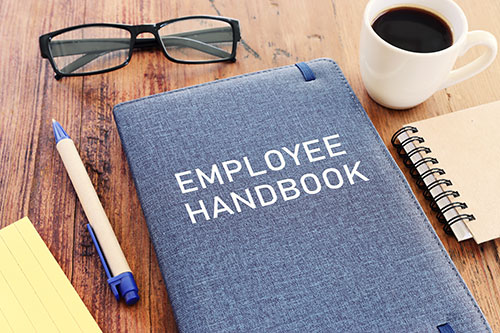
If you have employees, you probably need an employee handbook. While California does not require employers to have a handbook, it is considered a best practice to have one as it can be a powerful tool in communicating your policies and procedures to your employees and in protecting yourself from misunderstandings that can lead to litigation. You are legally required to notify employees of certain rights and policies, and an employee handbook is one of the best places to do so.
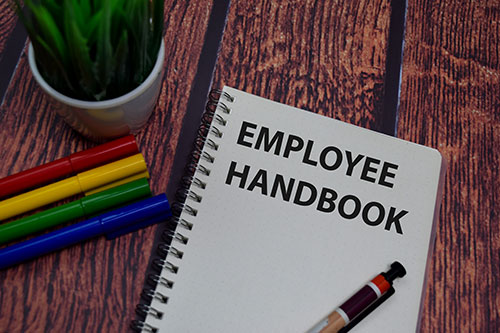
General information you should have in your employee handbook includes basic employment policies like wage and hour, sick leave, vacation and holidays, performance expectations, discipline procedures, and termination policies. Your employee handbook is a communication tool, so you should use it to clearly communicate your policies and procedures to your employees. In most cases, an employee handbook is considered a legal document and is legally binding. It also can be considered an employment contract unless you have a clear disclaimer that it is not. This is an area where it’s beneficial to have an HR consultant who is also an attorney.

Some of the specific things that should be in your employee handbook include, but are not limited to:

Some of the things you should look for when hiring an HR consultant include experience and the ability to help with a broad spectrum of HR needs covering the entire employment life cycle from pre-employment to termination. They should be able to help you by ensuring your onboarding processes are compliant with state and federal laws, crafting policies and procedures to minimize your legal risks, and helping you handle employee terminations, disability accommodations, and workplace complaints. You often will have more protection if your HR consultant is also an attorney or works with an attorney.

True HR consultants definitely can help you understand the ever-changing COVID mandates. It’s risky to rely on insurance carriers or payroll company consultants for this information since HR isn’t all that they do on a regular, daily basis. HR consultants, on the other hand, can help you not only understand the mandates, but also implement the required business practices while mitigating your risk of potential lawsuits or governmental fines. HR consultants have the added benefit of seeing how other businesses are managing these challenges and can bring you the best practices of what’s working for others.
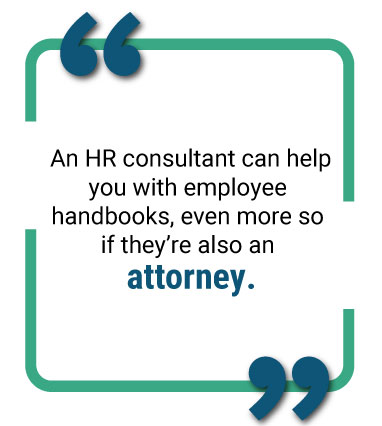
Yes, an HR consultant can help you with employee handbooks. Specifically, and even more so if they’re also an attorney, they can help ensure that your employee handbook is compliant with state and federal labor laws. An HR consultant can help you ensure that your handbook includes all the notices and policies that are required and that you’re informing your employee of all their legal rights. An HR consultant who is an attorney can also make sure that your employee handbook isn’t an implied contract that would provide an exception to at-will employment status.
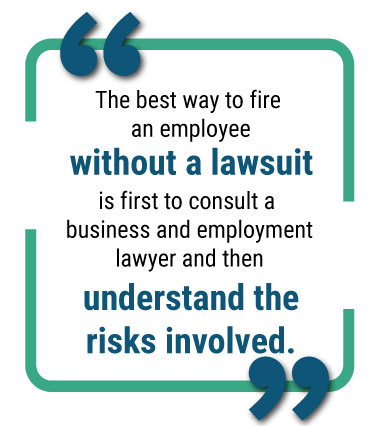
The best way to fire an employee without a lawsuit is to first consult a business and employment lawyer and understand the risks involved. This is why it’s so valuable to work with an HR consultant who also is an attorney or works with an attorney. You minimize your risk of a lawsuit when you make sure you’re in compliance with all the labor laws. Some general things to keep in mind are being sure there’s written documentation of prior discipline and work performance issues and also being clear and documenting why the employee is being fired.

When you are firing an employee, it’s best to be clear, direct, and professional. You need to tell the employee that you’re terminating their employment as of a particular date (often the same day as the discussion). Give an objective reason for the termination, but don’t belabor the point or justify your decision. You’ll also need to tell the employee the next steps regarding their final check, return of any company property, etc. Firing an employee is never fun and missteps can open you up to a potential lawsuit, so it’s always best to get legal advice from a business and employment attorney.
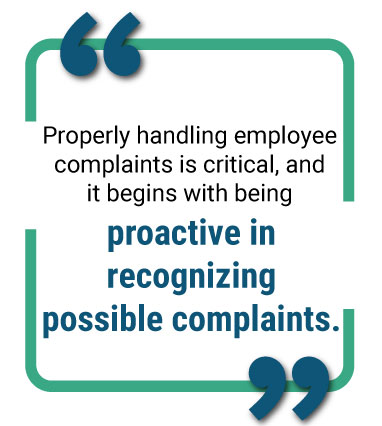
Properly handling employee complaints is critical, and it begins with being proactive in recognizing possible complaints. Complaints can be made on the basis of harassment or discrimination, or sometimes based on a “toxic” or “hostile” environment. Either way, it’s important to take complaints seriously and listen to the employee reporting the complaint without blaming or drawing conclusions. Ask questions to uncover as many details as possible, and take notes for your attorney to review or have the employee put their complaint in writing. It’s important to take immediate action to determine what happened and what remedial action needs to take place. You may need to have a qualified person makes findings of fact based on a preponderance of the evidence – i.e., alegal investigation. Sometimes, an investigation is even more important to document conduct that has not occurred, to support your reasonable business decision if challenged before the EEOC, DFEH or in court. This is a situation where it’s good to have an HR consultant who is an attorney or works with an attorney, to help you understand what options are compliant with law, and the risks of taking action with or without an investigation.
Employee complaints can range from serious allegations to small complaints with a coworker. A common misconception is that an employee complaint needs to be filed to be valid. This is not true. If the employer overhears a conversation between coworkers complaining about the workplace, they should address those concerns whether they’re filed or not. If the issue is not addressed then that creates a high-risk situation.
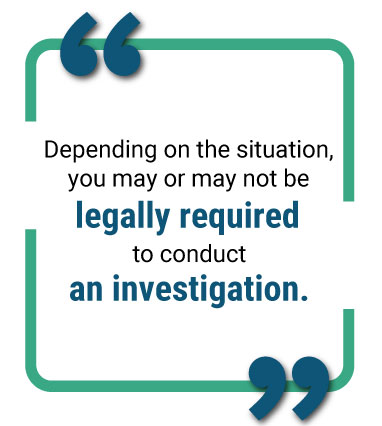
If an employee files a complaint, you should first notify your business and employment attorney to get instructions based on your specific situation. Depending on the situation, you may or may not be legally required to conduct an investigation. And even if not required, an attorney can tell you when it may still be good to conduct an investigation anyway.
Sexual harassment complaints always must be addressed and investigated by someone legally authorized to do so. (In California, that’s a licensed attorney or private investigator, or a properly trained W2 employee of the company. Sexual harassment complaints cannot be investigated by outsourced HR consultants who are not attorneys.)
You will need to implement interim measures while an investigation is being conducted and then take additional action to repair the situation after the investigation is concluded. This may include employee discipline or termination, as well as responding in writing to the complainant.

Yes, if you have at least five employees, you are legally required to do workplace sexual harassment training, or more specifically, Sexual Harassment and Abusive Conduct Prevention Training. It is mandatory in California for all businesses with five or more employees to have two hours of workplace sexual harassment prevention training every two years for supervisors and managers, and one hour of this training every two years for all other employees. You also must keep records of these trainings.

To meet the legal requirement, a workplace sexual harassment prevention training must include information about the federal and state laws regarding the prevention and correction of sexual harassment. It must also inform attendees about the remedies and recourse available to victims of sexual harassment. The training must be interactive and can be held in person or online. Employees can be trained individually or as a group. The content of the training is required to include practical examples of harassment, discrimination, and retaliation as well as guidance on preventing abusive conduct and sexual harassment.

The California state law prohibiting workplace sexual harassment is the Fair Employment and Housing Act. Workplace sexual harassment refers to “both unwelcome sexual advances, or other visual, verbal, or physical conduct of a sexual nature and actions that create an intimidating, hostile, or offensive work environment based on an employee’s sex. Under California law, the offensive conduct need not be motivated by sexual desire, but may be based upon an employee’s actual or perceived sex or gender-identity, actual or perceived sexual orientation, and/or pregnancy, childbirth, or related medical conditions. This definition includes many forms of offensive behavior and includes gender-based harassment of a person of the same sex as the harasser, and actions that subject co-workers to a hostile work environment,” according to the State of California Department of Justice. The legalities of workplace sexual harassment are complex, which is another reason to have an HR consultant who also is a lawyer working on your behalf to mitigate your risk.
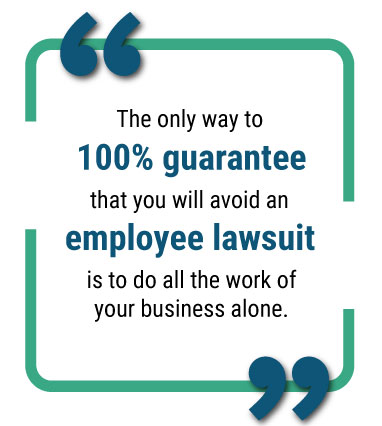
The only way to 100% guarantee that you will avoid an employee lawsuit is to do all the work of your business alone, which is not a practical or realistic way to run a business. The next best thing is to carefully and consistently take steps to mitigate your liability risk. You can do that by running your business in compliance with labor and employment laws and keeping good records of doing so.
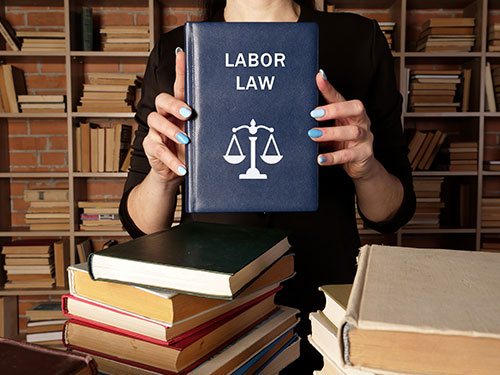
Keeping up with all of the California employment laws can feel like a full-time job. That’s because it is. And that’s why it’s easiest to work with an HR consultant who is also a labor and employment lawyer or make sure that your HR team is working with an attorney. It’s their job to keep up with all of the ever-changing laws and then advise you on how to stay legally compliant. Otherwise, it’s on you to receive updates of new legislation and mandates from the California Department of Industrial Relations, the California Department of Fair Employment and Housing, California Division of Occupational Safety and Health (Cal/OSHA), and others. You’d also want to keep up with court decisions and other trends and issues related to the laws. You would then have to interpret those updates to determine how they apply to you and your business as well as come up with an action plan to update your policies and procedures to maintain compliance. Or, instead, you can work with a legal and HR consultant firm like Emerzian Shankar Legal Inc. and allow them to do all of this for you.
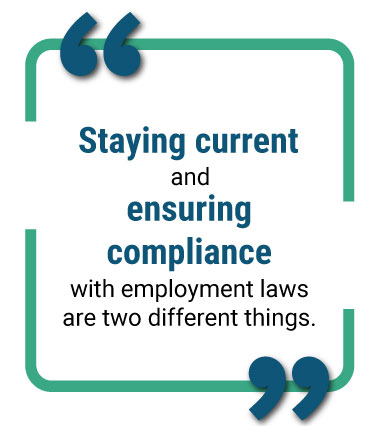
Staying current and ensuring compliance with employment laws are two different things. Receiving and reading updates from the California Department of Industrial Relations, the California Department of Fair Employment and Housing, California Division of Occupational Safety and Health (Cal/OSHA), and other sources can keep you current. But to ensure compliance, you need to interpret how the updates apply to your business. You then need to modify your business practices accordingly. The easiest and best way to accomplish both staying current and ensuring compliance is to work with an HR consultant who also is a labor and employment attorney or works with an attorney.

Having policies and procedures in place is just the first step, you also need to ensure compliance in the workplace. You do this by clearly communicating the policies and procedures in writing and then consistently applying and enforcing them. This requires ongoing employee training and fostering a company culture of compliance. You can do this by taking a proactive approach, keeping employees engaged in the process, and by recognizing and rewarding those who do the right things. Make regular documentation a habit that all supervisors and managers embrace so that it happens consistently. And develop a system to regularly monitor and review your compliance efforts.
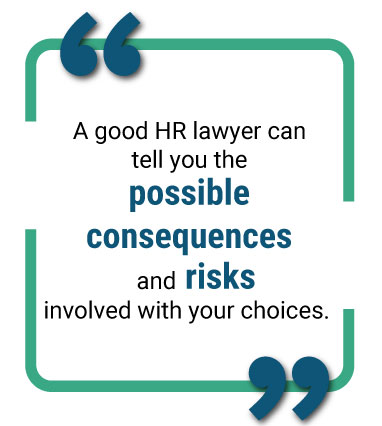
When you consult an attorney for HR, you do not have to follow their advice. The choice is always up to you on how you run your business. However, a good HR lawyer is on your side and can tell you the possible consequences and risks involved with your choices. Their job is to help you fully understand all your options and the associated risks so that you can make informed decisions that are best for your business. Good HR lawyers are experienced and keep up with all the nuances of labor and employment law so that you don’t have to. But they are there to provide you with the information and support you need to make your own decisions, not to make the decisions for you.